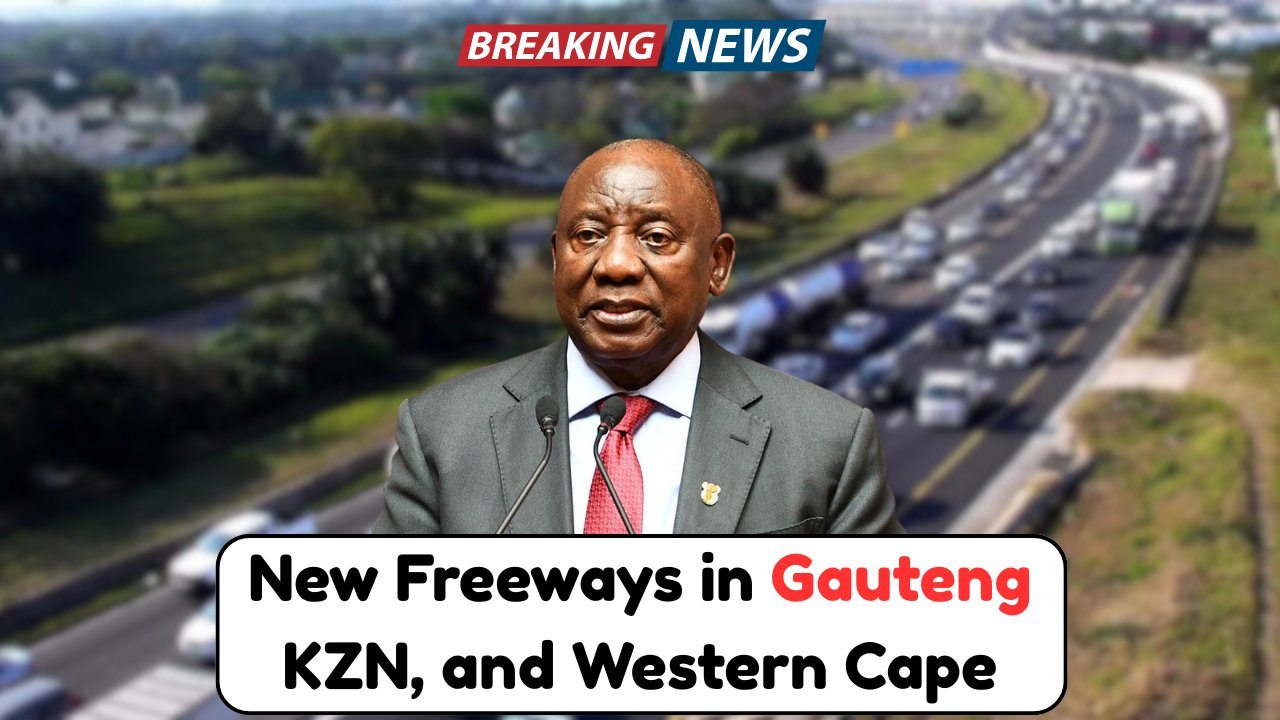New Motorways – The South African government has announced a series of new motorways across Gauteng, KwaZulu-Natal (KZN), and the Western Cape to drastically reduce travel time for residents of Cape Town. This monumental infrastructure project aims to ease congestion, speed up commutes, and improve road safety. With significant investment from both provincial and national governments, the new motorways are poised to revolutionize travel in these regions, especially for daily commuters.
Key Features of the New Motorways Project
The new motorways will span major urban and suburban areas, significantly benefiting Cape Town residents, who have long struggled with traffic congestion. Here’s a breakdown of the key features of this transformative project:
- Improved Connectivity: The motorways are designed to create smoother and faster links between different regions, reducing travel time for commuters traveling across Gauteng, KZN, and the Western Cape.
- Increased Road Capacity: The expansion will introduce wider roads, multiple lanes, and interchanges, allowing more vehicles to pass through each route without delays.
- Enhanced Traffic Management: The use of advanced technology will enable better management of traffic flow, reducing accidents and the risk of roadblocks.
- Environmental Benefits: New, more efficient traffic systems will reduce fuel consumption and emissions, helping to mitigate the environmental impact of long road journeys.
Benefits for Cape Town Residents
The introduction of these new motorways will provide numerous advantages for Cape Town residents, particularly when it comes to their daily commutes and quality of life.
- Reduced Travel Time: The new routes will help reduce the travel time for residents traveling from Cape Town to other parts of South Africa, as well as inter-city travel.
- Improved Safety: With better road infrastructure, there will be fewer traffic accidents and smoother driving conditions.
- Cost Savings: Faster commutes mean lower fuel costs, as residents will spend less time on the road.
- Economic Impact: By reducing travel times, the project will allow businesses to grow and expand, leading to more job opportunities and a boost to the local economy.
Where Will the New Motorways Be Located?
The new motorways will be strategically placed to connect high-traffic areas and reduce congestion. Here are the key locations to expect changes:
- Gauteng: Major highways will be upgraded, such as the N1, N3, and N4, which serve as primary links between Johannesburg, Pretoria, and surrounding areas.
- KwaZulu-Natal: The Durban metropolitan area will see the introduction of new motorways connecting the city to other regions, like the North Coast and South Coast, helping ease the congestion in this rapidly growing area.
- Western Cape: Motorways connecting Cape Town to outlying areas such as Stellenbosch and Paarl will be expanded to accommodate growing traffic volumes.
Project Timeline and Expected Completion
The motorways project is divided into several phases, with work expected to begin shortly and complete in the coming years. Below is an estimated timeline for the completion of each phase:
| Phase | Location | Start Date | Completion Date | Estimated Cost |
|---|---|---|---|---|
| Phase 1 | Gauteng (N1, N3) | January 2025 | December 2026 | R5.5 Billion |
| Phase 2 | KZN (Durban Metro) | March 2025 | June 2027 | R4.2 Billion |
| Phase 3 | Western Cape (N2, N1) | June 2025 | September 2028 | R6.8 Billion |
How Will the Government Fund These Projects?
The South African government has allocated significant funds for these projects. Government payments will be made directly to the contractors to facilitate the construction, which is expected to create thousands of jobs in the infrastructure sector. The government’s partnership with private contractors will ensure the timely completion of the project.
- Government Funding: A large portion of the funding for this project comes from the South African national budget and provincial government allocations.
- Private Sector Investments: The project will also involve contributions from private investors who see the long-term benefits of infrastructure development.
FAQ – New Motorways
Q1: How long will the new motorways reduce my commute time?
A1: Depending on your location, you could see up to a 50% reduction in your commute time. For example, traveling from Cape Town to Johannesburg could be completed in a few hours less.
Q2: Will toll fees be introduced on the new motorways?
A2: While some motorways may include tolls, the South African government has indicated that toll payments will be kept minimal to ensure the roads remain accessible to the public.
Q3: How will these new motorways affect local businesses?
A3: Businesses will benefit from quicker transportation of goods and services, leading to improved productivity and reduced logistical costs. Local companies will also gain access to new markets as road connections improve.
Q4: Can I expect delays during construction?
A4: Yes, there may be minor delays as construction takes place, especially during peak hours. However, the government is working hard to minimize disruptions to daily traffic.
Q5: How can I contact the department handling this project?
A5: For more information on the new motorways and construction progress, contact the South African National Roads Agency (SANRAL) at:
Conclusion of New Motorways
The new motorways in Gauteng, KZN, and the Western Cape will provide much-needed relief to residents of Cape Town and other regions, slashing travel times, improving safety, and boosting the economy. These investments reflect the government’s commitment to improving South Africa’s infrastructure, which will have long-lasting benefits for commuters, businesses, and the environment. As the project progresses, residents can look forward to a more connected and efficient transportation network.
The South African government continues to prioritize infrastructure development, ensuring that future generations can enjoy improved mobility and access across the country.

